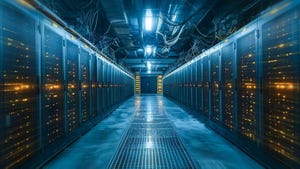
Insight and analysis on the data center space from industry thought leaders.
The Second Machine Age: Our Future With Artificial Intelligence
Human intelligence still supersedes computers in many ways, such as in common sense, empathy and critical thinking. However, the day is not too far off when artificial intelligence will change life as we know it.
March 7, 2016

Sudheesh Nair is President of Nutanix.
Recently, I went to New York and had to get a taxi at LaGuardia Airport, an arguably antiquated airport. To do so, you must stand in line and wait for an attendant to fill out a ticket with the appropriate zone for your final destination. When your taxi drives up, this person hands the ticket to the taxi driver and you can then go on your way.
As I waited for my taxi, I couldn’t help but see this cumbersome process as a classic queuing protocol. While easily solved through technology, this inevitable change would leave this attendant without a job. For better or for worse, this is the fate of many jobs as artificial intelligence catches up with human intelligence — and that day is not as far off as we may think. Artificial intelligence is no longer relegated to the fictional imaginings of such worlds as “Blade Runner,” “The Matrix” or “Star Wars.”
Computers aren’t taking up entire rooms anymore, taking days to crunch specific queries, within reach of only a select few. Now they’re in our pockets, on our wrists, in our refrigerators and even walking around with us in our shoes. But even with this advancement, we are nowhere near the potential that the merger of computer and human intelligence has promised for so long. Human intelligence still supersedes computers in many ways, such as in common sense, empathy and critical thinking. However, the day is not too far off when artificial intelligence will change life as we know it.
In this second machine age, technology will fit seamlessly into our lives, bringing remarkable benefits to consumers everywhere. Underlying hardware will act as an invisible infrastructure as intuitive software interfaces and automation do most of the work. Take, for example, the transportation industry. Right now it hinges on human input to drive cars and buses, conduct trains, and fly planes. We are already seeing the potential of AI in revolutionizing how we get from place to place, as driverless cars are on the cusp of coming to market. By removing the human error and the cost that employment incurs, transportation will become more affordable and will even, for many people, eliminate the need to own a car — one of the most underutilized resources we currently depend on. This will reduce waste, clean up the air and give us more room for development in urban areas.
These consumer benefits also extend to our health care. It doesn’t seem too far off to imagine a time when a computer could make the simple diagnoses that account for a vast majority of issues presented to doctors, making medical care more affordable, more accurate and more widely available. Medical professionals would then be freed up to focus their attention on unusual or complicated cases that require their human adaptability, creativity and innovation. They would also be able to focus their attention on advancements in other areas, such as the individualized care that human genome sequencing promises.
Of course, with all of the automation AI will bring us, it will eliminate many of the jobs currently undertaken by humans. Machines will be able to drive for us, diagnose us, run our routine IT support, give us financial guidance and hail us a cab at the airport.
While this may seem like the end of days for employment, just remember that we have been through these shifts throughout time, even as recently as the Industrial Revolution. Advancements in technology have often improved quality of life at the expense of mundane tasks. Look no further than the Guttenberg press. While it put many a monk out of work, it also made books available to the masses, improving the lives of millions of people through accessible knowledge — much like the Internet has done today.
This massive shift we are facing leaves us with innumerable questions and complications. What kinds of jobs will people have? How will we distribute wealth? What possibilities lay in front of us? For years, people have been clambering for more education to stay ahead of the changes. While this is important, education is not enough. Computers can access more knowledge than is even fathomable to our limited minds.
What we must do is adapt to the coming tide of change. We can do this by leaning in to what makes us innately human: our ability to improvise, to innovate and to inspire. Machines cannot yet replace these qualities and they also cannot make the genuine human connections that we all thrive and depend on. The key is to modify our approach to the way we live with technology so people like the taxi ticket attendant will be able to ride the wave and not get pulled under the riptide.
Industry Perspectives is a content channel at Data Center Knowledge highlighting thought leadership in the data center arena. See our guidelines and submission process for information on participating. View previously published Industry Perspectives in our Knowledge Library.
About the Author
You May Also Like









